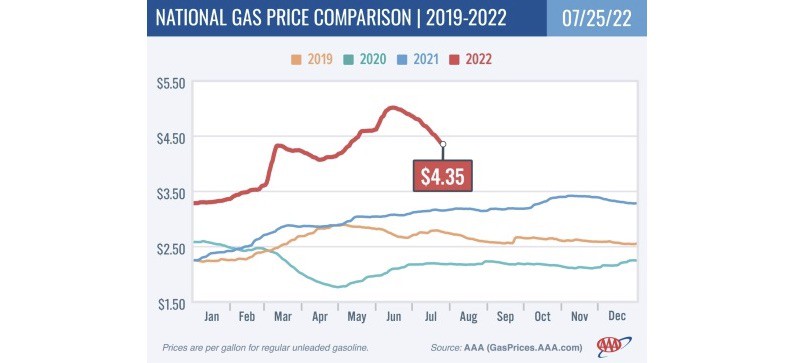Today’s national average of $4.35 is 63 cents less than a month ago and $1.20 more than a year ago
Washington, D.C.—Lackluster demand for gas and lower oil prices led to pump prices falling again, down 17 cents since last week to $4.35. The steady decline is due to low domestic demand for gasoline and oil prices that remain in the mid-$90s per barrel. The price of gas has now fallen every day since hitting a record $5.01 on June 14.
“Consumers appear to be taking the pressure off their wallets by fueling up less,” said Andrew Gross, AAA spokesperson. “And there’s reason to be cautiously optimistic that pump prices will continue to fall, particularly if the global price for oil does not spike. But the overall situation remains very volatile.”
According to new data from the Energy Information Administration (EIA), gas demand rose from 8.06 million b/d to 8.52 million b/d last week. However, that rate is 800,000 b/d lower than last year and is in line with demand during the middle of July 2020, when COVID-19 restrictions curbed demand. Additionally, total domestic gasoline stocks increased by 3.5 million bbl to 228.4 million bbl, signaling that low demand led to growth in inventory last week. If gas demand remains low as stocks increase, alongside a continuing reduction in crude prices, drivers will likely continue to see pump prices decline.
Today’s national average of $4.35 is 63 cents less than a month ago and $1.20 more than a year ago.
Quick Stats
The nation’s top 10 largest weekly decreases: Kansas (−29 cents), Iowa (−25 cents), Oklahoma (−25 cents), Missouri (−23 cents), Ohio (−22 cents), Wisconsin (−22 cents), Nebraska (−22 cents), Delaware (−21 cents), Wyoming (−21 cents) and Indiana (−21 cents).
The nation’s top 10 least expensive markets: Texas ($3.85), South Carolina ($3.86), Georgia ($3.88), Mississippi ($3.89), Alabama ($3.92), Tennessee ($3.93), Arkansas ($3.93), Louisiana ($3.94), Oklahoma ($3.96) and Kentucky ($4.00).
Oil Market Dynamics
At the close of Friday’s formal trading session, WTI decreased by $1.65 to settle at $94.70. Crude prices declined last week as the market continues to worry that weak demand, which was expected to remain robust throughout the summer, could continue to push prices lower. A strengthening dollar also helped to push crude prices lower last week. For this week, crude prices could continue to decline if demand concerns persist. Additionally, EIA reported that total domestic crude stocks decreased by 500,000 bbl to 426.6 million bbl, just over 13 million bbl lower than the storage level in mid-July 2021.










Comments are closed.